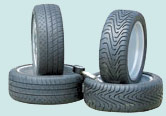Discount Tyres .co.uk
Home |

Tyre Care
The manner in which a car is driven can lead to excessive tyre wear and possible damage. For example, not adjusting the tyre pressures when the car, or van, is fully laden or when driven at high speeds can cause problems. The following additional advice will help to ensure you get maximum mileage:
- When undertaking long journeys, especially at speed on motorways, examine the tyres both before and during the journey (but do not check pressures while the tyres are warm).
- Avoid harsh braking, fierce acceleration and fast cornering (the steering wheel of cars with power-steering should not be turned while they are stationary).
- Avoid driving over or scrubbing against kerb edgings or other raised obstructions.
- If it is absolutely necessary to drive over rough, uneven, unmade ground or over ground littered with debris, check the tyres soon afterwards to ensure that no foreign objects have become trapped in the tread patterns and examine the sidewalls for cuts or bulges.
How to Avoid
Tyre Problems
There are many individual causes of tyre wear, however, there
are two main areas which cause most problems. These
are under-inflation and overloading in
combination with excessive speed.
Under-Inflation
Surveys by tyre industry bodies show that at least 25% of all tyres examined
are under-inflated by more than 10%. Neglect of inflation pressures
is one of the principal causes of rapid wear, uneven tread wear
and premature tyre failure. It should also be stressed that over-inflation
may result in inferior vehicle handling, excessive tyre wear and premature
tyre failure.
Overloading
Loading cars, light vans and lightweight trailers above what they are
designed to carry is illegal. It is also likely to put excessive strain
on the tyres resulting in greater than normal deflation and overheating
which, in turn, leads to more rapid wear, greater susceptibility to
impact damage and the danger of premature failure. Owners should check
their vehicle handbook which will provide increased inflation pressures
for full load conditions.
Speeding
Travelling for long distances on motorways at sustained high speeds and
generally exceeding statutory speed limits puts strenuous demands
on tyres especially in terms of heat generation. Tyres in good condition
and correct inflation levels are designed to withstand the heat build-up
at their maximum rated speeds. However, if the inflation pressure is
significantly below those recommended then excessive heat will be
generated and in
consequence wear will be accelerated and deflection will be greater
with the risk of premature, and sometimes catastrophic failure. ie
a tyre blow out!
Correct and regular care and maintenance of tyres - and don't target the spare - will re-pay motorists with greater safety, longer life and ultimately savings in cost. Should a motorist require any help or advice, they should consult a reputable tyre dealer who will normally offer advice free of charge.
The Tyre Industry
Council is the UK's principal tyre safety organisation supported by
major tyre companies, retreaders and retailers.
Tyre related pages: